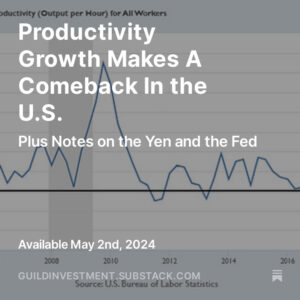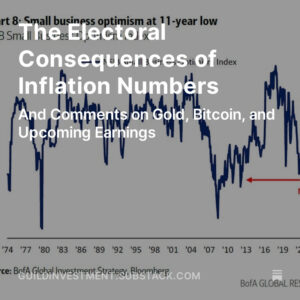Getting Bullish on China
After a dismal 2018, the Chinese stock market has been one of the world’s better performers in 2019, with the MSCI China index up almost 13% as of this writing.

Source: Bloomberg LLP
As we have noted in several recent letters, the poor performance of the Chinese stock market for the last six months and the slowing of the Chinese economy, while they have corresponded with trade tensions with the U.S. and other trading partners, are really the result of policy actions by the Chinese government. Modern China has long been a financial “wild west,” and the government has been through cycles of loosening and tightening credit – loosening when the government wants to encourage growth, and tightening when it gets concerned about instability due to too much leverage. Especially since the global financial crisis and recession of 2008–2009, China has walked a tightrope between keeping its growth “miracle” going, and reining in the excesses in the unofficial, “shadow” banking sector that could lead to a crisis in the future. The purpose is to maintain economic growth and to continue to bring China’s poor into the middle class.
Until last year, the government was in a tightening cycle, ratcheting back the growth of credit and causing growth to slow. Halfway through 2018, that began to change, with the government gradually implementing a new cycle of loosening.
We believe that as 2019 progresses, further stimulative policies will be unveiled. Property is one area of cardinal importance for Chinese finance, and thus far the year has seen a powerful rally in U.S. dollar-denominated Chinese developers’ bonds, for which there has been strong demand from domestic and international institutional investors. This has boosted the health of some borrowers and allayed fears of immediate default risks.
There is typically a lag of nine months or so before such policies begin to manifest in higher economic growth, so as we have noted, we anticipate that the Chinese economy will likely trough later this year, and accelerate into year end and 2020. Recently, the Chinese stock market is rising in anticipation of this economic acceleration – as stock markets typically do. A resolution to the impasse in trade negotiations, which we believe is desired by both sides to boost their domestic political positions, will act as a further stimulus.
(As usual, we note that the Chinese stock market’s behavior is strongly sentiment-driven, more so than markets in the developed world, since it is small relative to the Chinese economy. The performance of domestic Chinese stocks really depends on the mindset of Chinese retail investors. That has begun to strengthen but has not quite yet reached bull-market territory. However, we are watching closely, and have begun to be interested in some Chinese technology shares where restrictive government regulations have begun to turn more lenient again.)
Some analysts note that Chinese money supply growth is accelerating, and that low inflation and easier lending policies could cause it to accelerate further. This is typically a phenomenon correlated with Chinese stock market rallies.
Besides policies to stimulate the economy, the government is also acting to stimulate the stock market directly, rolling back some curbs on short-selling, leverage, and derivatives that it had implemented in 2015 in the wake of a Chinese stock market crash. While critics suggest that the current liberalization is premature, others believe that there is little risk of a bubble reappearing at this point. And rallying markets will help Chinese small and mid-sized firms secure funds for expansion, since they are often shut out of official lending channels in favor of larger and state-owned enterprises. Chinese officials know well that it is small firms that are the real engines of economic, employment, and productivity growth (something that is true in all economies, not just in China). If the government can maintain a stable and positive stock market environment, it will also help to attract foreign funds. Indeed this is already happening; foreigners bought $8.5 billion worth of domestic shares in January.
Investment implications: It is not yet the low point for slowing Chinese growth, but we believe that the domestic Chinese stock market is beginning to price in an economic reacceleration. It is also responding to positive stimulus measures and regulatory liberalizations from the central government that are directly aimed at boosting the stock market and increasing its role as a funding source for the small companies that are China’s main engine of economic and employment growth. In particular, we are watching some Chinese technology shares. If Chinese retail investors continue to be enthusiastic, and if a trade settlement accelerates the inflow of foreign capital into domestic Chinese shares, we believe that 2019 could be a good year for Chinese stocks.







